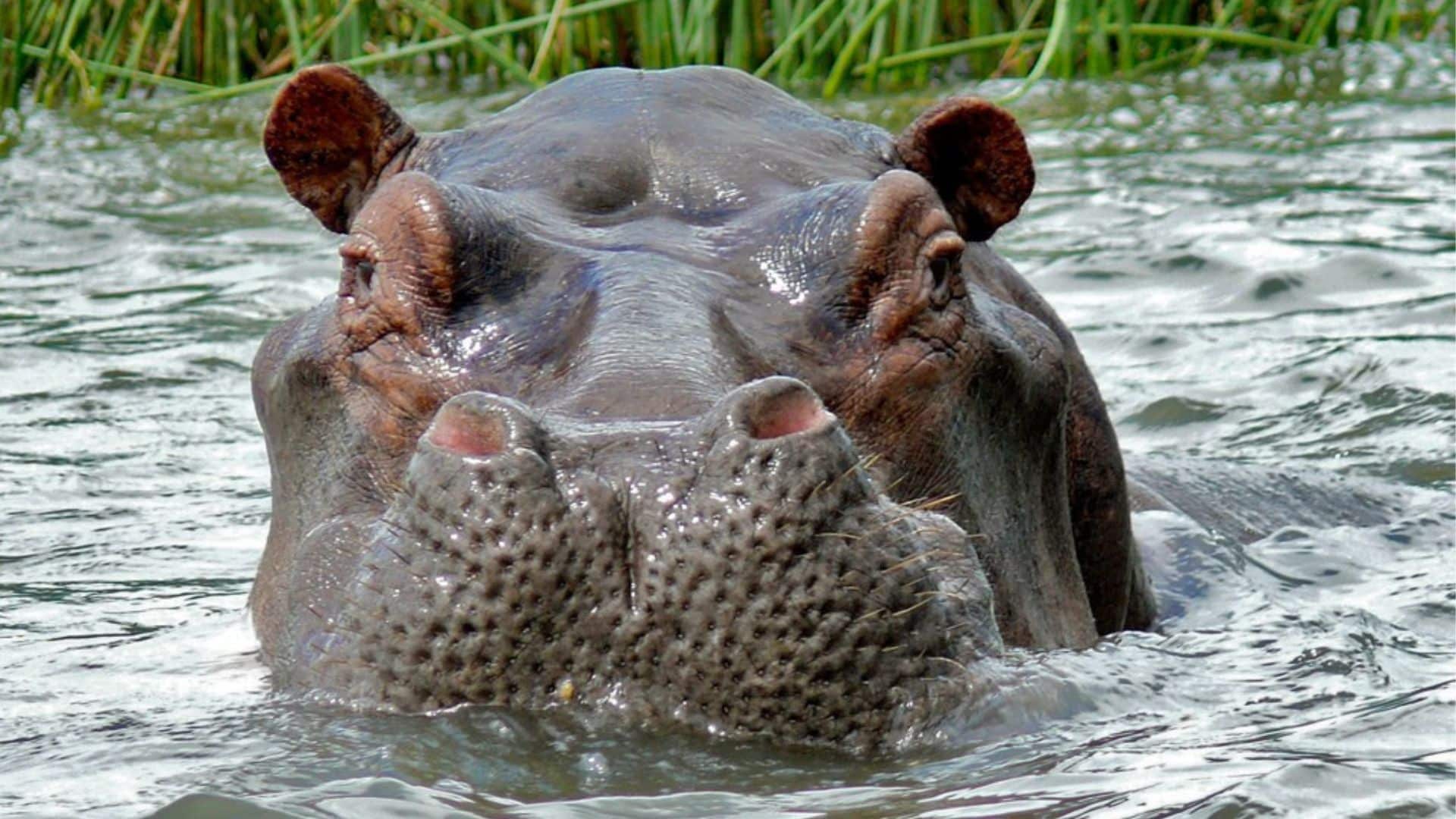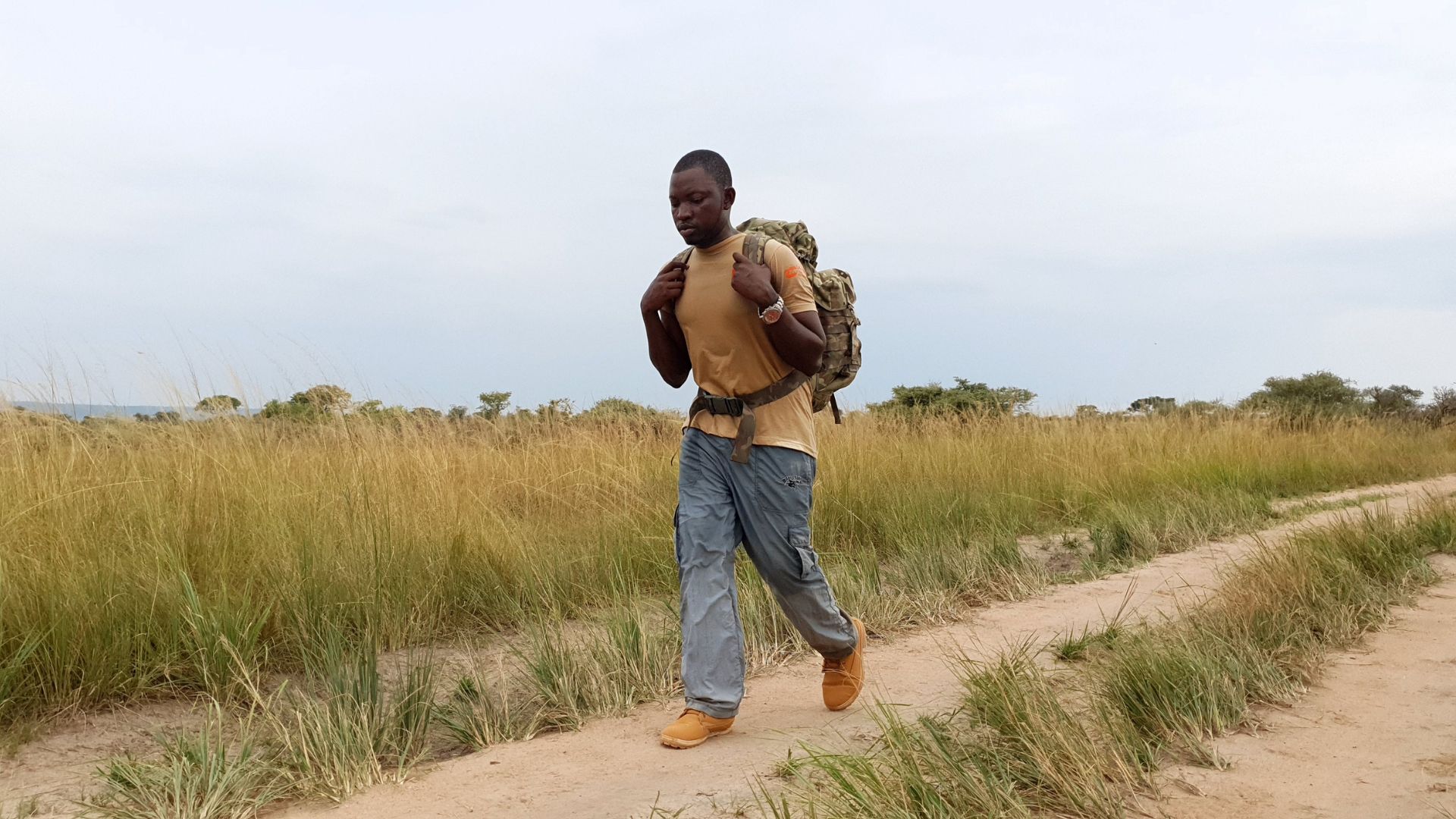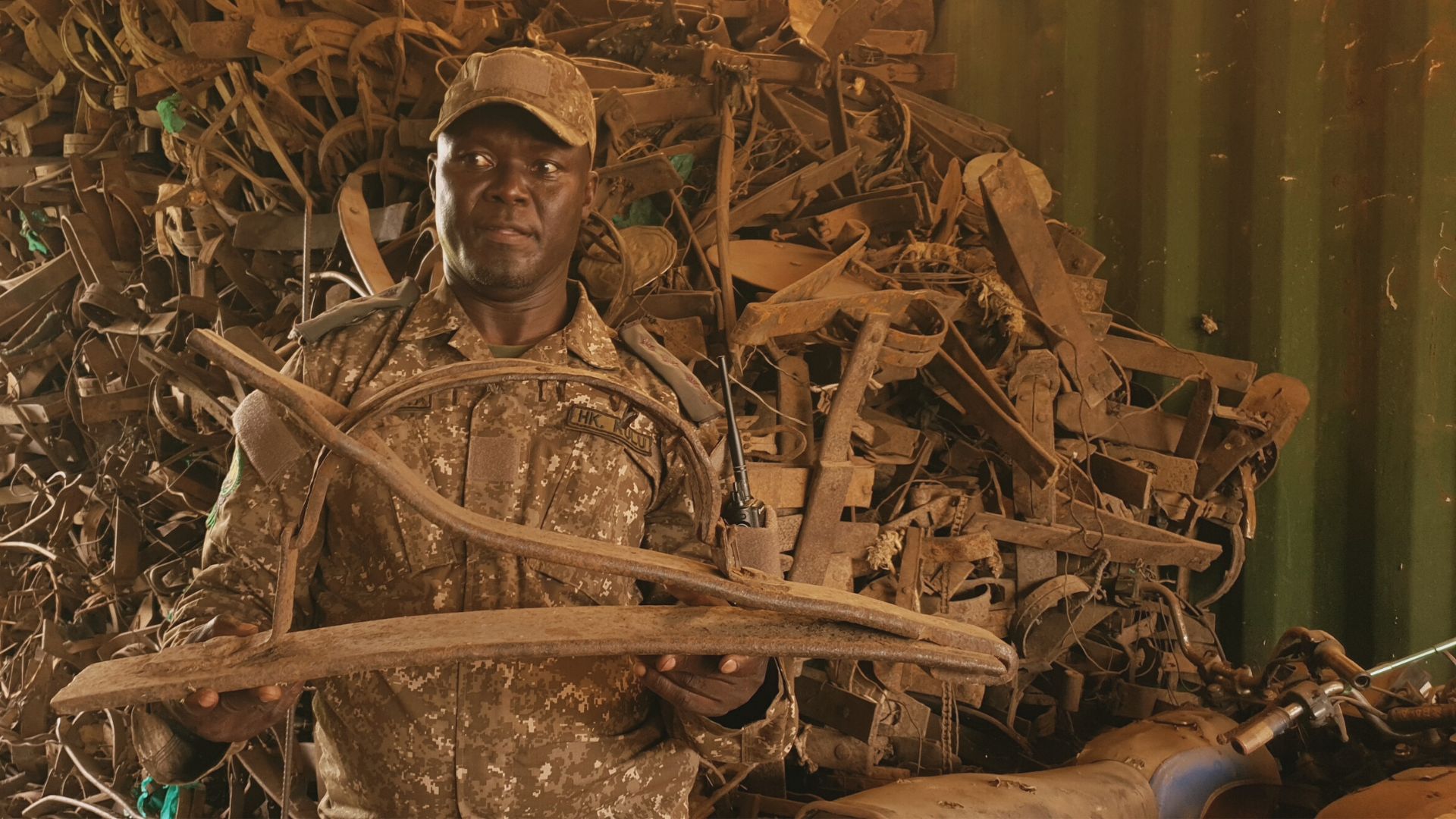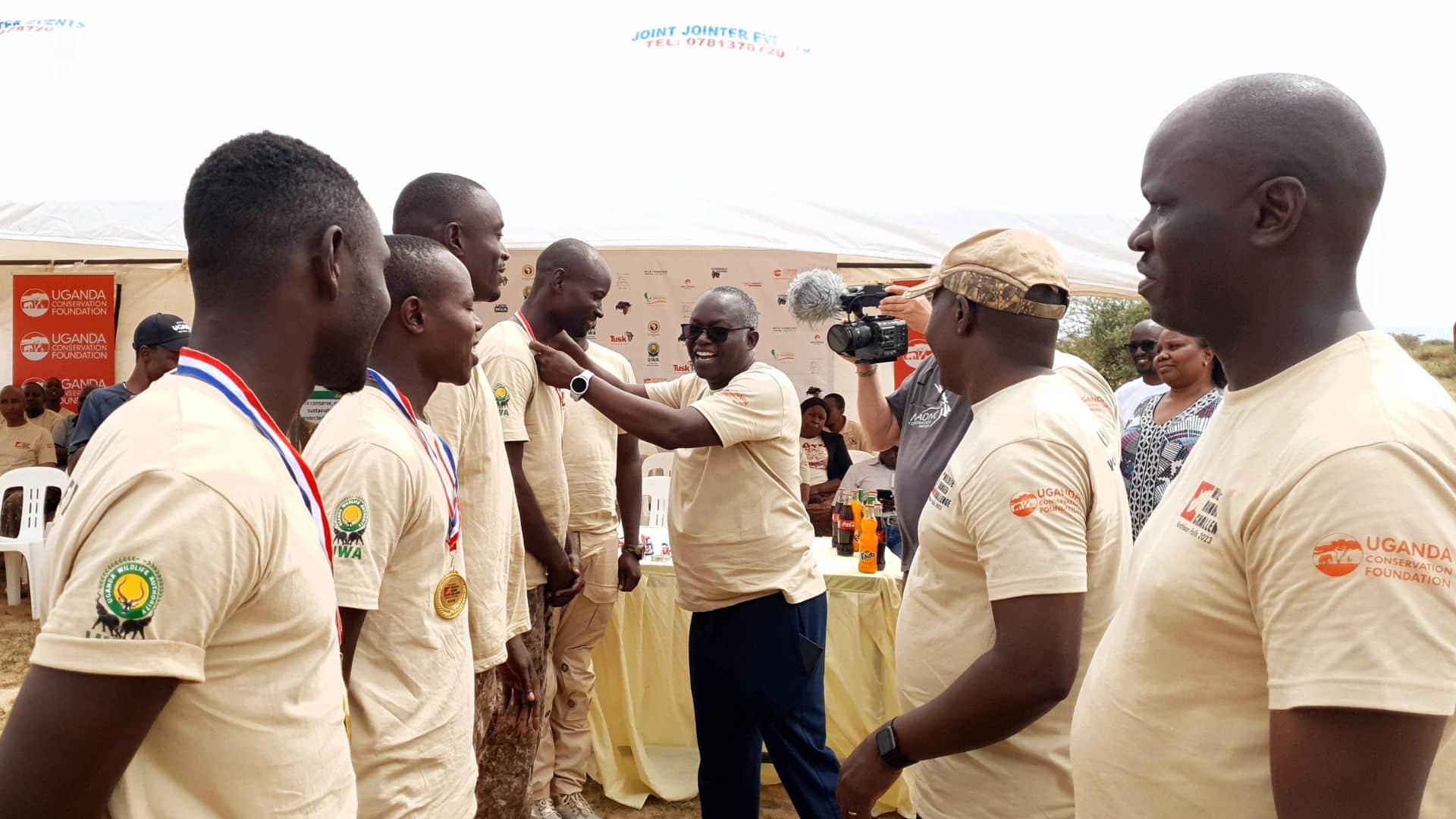To prove they have what it takes to combat poachers, Uganda rangers race 21 km in scorching heat. They vow: No species will disappear under their watch.

A hippo in the Murchison Falls National Park in Uganda, September 2008. (Photo by Bernard Dupont, CC BY-SA 2.0 DEED)
This article was produced exclusively for News Decoder’s global news service. It is through articles like this that News Decoder strives to provide context to complex global events and issues and teach global awareness through the lens of journalism. Learn how you can incorporate our resources and services into your classroom or educational program.
On a tranquil morning in September, the remote Pakuba airstrip came alive as rangers from across Uganda gathered to take part in a gruelling competition.
The runners would have three hours to cover 21 km (13 miles) in scorching heat through Murchison Falls National Park to reach the point where the White Nile flows into Lake Albert and the sanctuary of “Hippos’ Pool,” where these colossal creatures used to thrive in big numbers.
It is a show of fitness. It is their job to protect their country’s magnificent wildlife and see off the cruel poachers who threaten the animals with extinction.
Eighteen four-man teams arrived for the annual Wildlife Ranger Challenge in Uganda. Teams elsewhere in Africa did the same as the continent-wide challenge — conceived during the Covid-19 pandemic to keep rangers employed and supported by international conservation organisations — reached its climax for 2023.
To make the challenge even tougher, the runners would carry rucksacks, each loaded down with 22 kg (48.5 lbs) of beans.

Ranger Raymond Odong running with a heavy rucksack as part of the Wildlife Challenge. Photo by Enock Wanderema.
Covid and conservation
As a mere journalist, I was spared the burden of the beans but Raymond Odong, a seasoned ranger with eight years of service at Uganda’s Lake Mburo National Park, saw it as a matter of honour to carry the heavy rucksack.
Our first day was spent limbering up. The next day, in the cool of dawn, the runners were off. It was organised by the Uganda Conservation Foundation (UCF), with support from the Tusk Trust UK. UCF founder Michael Keigwin said Covid-19 had deprived national parks of vital tourist revenue.
“So how do they feed their rangers, fuel their cars, make sure elephants aren’t eating crops and poachers aren’t killing animals?” he asked. “The tourism industry needs tourists to come back; animals to come back. This [the challenge] is a big movement to raise money and ensure the welfare of boys and girls on the front line — because those rangers take enormous risks.”
“Whenever I arrest a poacher, I have saved some animals and they are reproducing.”

Captain Kulu Kirya Haruna of the Uganda Wildlife Authority showing wheel traps used by poachers to catch kob antelope and other animals. Photo by Enock Wanderema.
Picking off poachers is difficult.
Along the way, rangers shared stories of the almost military-grade training they had to go through and the many dangers they routinely faced.
Odong spotted a lion’s footprint. “You can’t defend yourself against a lion but your reaction can buy you precious seconds and perhaps someone can rescue you,” Odong said. “When a lion attacks, maintain eye contact. Don’t run. It will outrun you. Don’t turn your back. That signals fear. By holding eye contact, you’re asserting your territory. It doesn’t guarantee safety but it can delay an attack.”
Another ranger, Valensi Tumukize from Uganda’s Queen Elizabeth National Park, spoke of the constant battle against poachers who, no sooner had they been disarmed, came back to kill more of Uganda’s regal but vulnerable beasts. In 2021, his team was commended for bravery after tackling poachers on a patrol.
“Recovering a gun is not easy; it is fire against fire,” he said. “Fortunately, I didn’t lose anyone in my team. Whenever I arrest a poacher, I have saved some animals and they are reproducing. I know my grandchildren will see elephants because I’m conserving them.”
Captain Kulu Kirya Haruna, who is in charge of security at Murchison Falls, showed us piles of vicious traps in which graceful kob antelopes and other animals had died agonising deaths. “[It is] in fact an organised crime involving a tangled web of influential figures,” he said.
Keigwin said that poverty drives poaching.
“The locals — about 80% under 25 — lack education and skills, leaving them unemployed and struggling for survival,” he said. “Instead of imprisoning them, we offer training opportunities. Remarkably, some transform into dedicated rangers through this process.”

Rangers receiving medals after taking part in Uganda’s Wildlife Challenge. Photo by Enock Wanderema.
Hope for the hippo
As the race continued, Odong seemed to flag and falter. I suggested he hitch a ride in one of the backup vehicles but his refusal was resolute.
“If I were to quit now,” he said, “I would not only fail the animals we protect but also disappoint my wife, who places her belief in me, and let down my entire team.”
For Odong, giving up would mean lacking the strength to carry a teammate in an emergency and ultimately becoming a weak link for the team. Still carrying the rucksack of beans, he made it to the end of the race.
Sweating and groaning, the runners reached the haven of Hippos’ Pool. “This place, where we stand … ” said Keigwin wistfully. “Poaching has ravaged our wildlife; we’ve lost over 50% of our hippos.”
A team from Kidepo Valley National Park won the challenge. But of course, if the rangers can beat the poachers, the real winners will be the wildlife.
Three questions to consider:
- How does Uganda’s economic health affect poaching?
- How did the Covid-19 pandemic make the job of Uganda’s rangers more difficult?
- What animals in your country are in danger of extinction? What is being done to save them?

Enock Wanderema graduated in 2022 from Uganda’s Christian University, with a first class degree in Mass Communication and Journalism. He is a regular contributor to Uganda’s Daily Monitor newspaper and has been an intern in the Kampala office of UN Global Pulse. He loves writing and bringing complex stories to life in the simplest ways.
Read more News Decoder stories about conservation:
